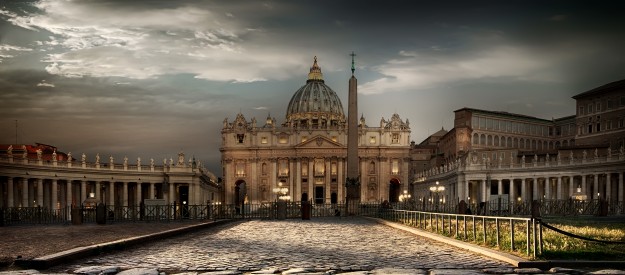"We are losing our attitude of wonder, of contemplation, of listening to creation and thus we no longer manage to interpret within it what Benedict XVI calls 'the rhythm of the love-story between God and man.'"
+ Pope Francis
A stormy Season of Creation

Sex-abuse scandals in the US Catholic Church implicated the Vatican and Pope Francis himself just as the worldwide ecumenical Season of Creation kicked off on September 1. As I commented when events broke, Catholic ecologists would do well to acknowledge these events for two reasons: the victims deserve it and unless we speak out against the causes of these scandals, our eco-efforts will be heard only by those already engaged in environmental concerns.
In mid-August, a grand jury report in Pennsylvania detailed horrific levels of the sexual abuse of minors and cover-ups by Catholic clergy. The report’s release capped weeks of anticipation and legal activity to suppress it. Within their many findings, the grand jury called into question Cardinal Donald Wuerl of Washington, D.C.—who had served as the bishop of Pittsburg in the 1990s and 2000s—specifically about his handling of abusive priests.
Then came charges of the sexual abuse of seminarians by the high-ranking US prelate (now former) Cardinal Theodore McCarrick.
For rank-and-file Catholics who had thought the worst of the sexual abuse crisis was over with the dramatic events that began in Boston in the early 2000s—Catholics who thought that the Church was finally healing and moving on—this latest barrage of news has resulted in widespread despair, disgust, and fury—feelings which continue to build.
Then, in late August, came another bombshell. Italian Archbishop Carlo Maria Viganò, a former United States papal nuncio, issued an eleven-page report that in part accused Pope Francis of failing to act on the allegations against McCarrick. In his statement, Viganò is said to have had informed the Holy Father weeks into Francis’s pontificate about McCarrick’s inclinations for certain seminarians.
The Viganò bombshell rattled the church here in the States and caused shockwaves around the globe—just as the World Meeting of Families was getting underway in Ireland, a nation and a church still reeling from its own sexual abuse crisis. On his return trip to Rome, the Holy Father would not speak directly about Viganò’s accusations—which only fueled the confusion and even fury of many US Catholics, as well as those in other nations.
Generally, left-leaning Catholics dismissed the Viganò report—and vilified the author—while conservatives demanded answers, and still do. But conservative Catholics aren’t the only ones wanting answers, and it seems that Rome is now agreeing to respond to Viganò’s accusations.
On the eco-front both here and overseas, many Catholic activists expressed shock at the accusations against Francis. Following the general reactions of the ideological left—who are often on the front lines of eco-advocacy—many US and international eco-advocates, and even high-ranking US prelates, saw Viganò’s charges as merely a conservative attack against the eco-friendly pontiff.
I would caution, however, that we must consider the matter in its fullness. Especially since this is more than a US phenomenon.
And I pray that my international eco-colleagues appreciate why many American Catholics, myself included, are demanding a full evaluation of everything that’s happened here in the States—in every diocese—and what happened in Rome under every pontiff informed of the despicable crimes perpetrated against minors, against young women, and against young men—which includes young men studying for the priesthood.
The Church's credibility and her effectiveness in preaching the gospel deserve nothing less.
Until resolved, this crisis will dampen for many Catholics the urgency to attend to almost every other issue—including climate change and ecological protection in general. In my earlier post, I suggested a way forward—of seeing in this crisis a connection with eco-protection and the messages of Laudato Si’.
But here, with the crisis growing, I would offer additional suggestions for my fellow Catholic eco-advocates.
First, within the canon of concerns most often expressed—the cry of the earth and the cry of the poor—we must include the cry of victims of sexual abuse, especially those abused by clerics and other authorities within the Church.
Second, within our demands for purifying the world, we must include the unwavering expectation for holiness within the Church—especially within the clergy and its leadership—which is foundational for the Body of Christ to effectively go forth and heal the created order.
And last, I would renew my long-standing call for Catholic ecologists to express our eco-concerns within the broadest teachings of the Catholic Church—through scripture and through the long-standing lessons of Catholic social thought. As much as Pope Francis has said and done for eco-awareness—Laudato Si’ especially—his teachings are founded on those of his predecessors, which are founded on divine revelation and long-standing Church teachings. To be heard by our more conservative Catholic brothers and sisters—those whom we seek to engage—the message of eco-protection may at times be best delivered by voices other than Pope Francis.
The work ahead of us is too important and too extensive to be disconnected from the greater life of the Church—both its past and its future. And so as we continue this most important Season of Creation, we Catholic ecologists will do well to acknowledge all that has gone wrong with our planet and our Church. We must pray, act, and advocate for all those suffering from all harms as we work for a cleaner, just world—and for the holiness of the Church that Christ has founded for the salvation of all.


















